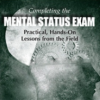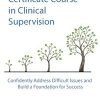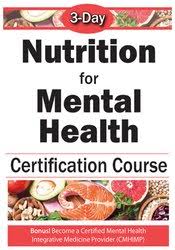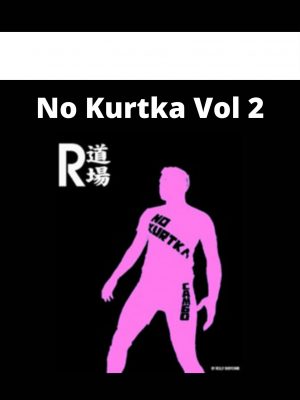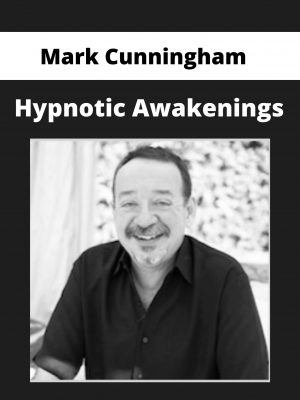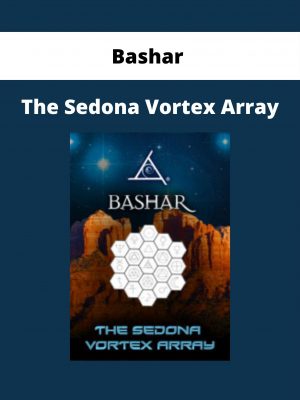Anne Procyk – 3-Day: Nutrition for Mental Health Comprehensive Course
$500 Original price was: $500.$189Current price is: $189.
Shopping Instructions:
- DISCOUNT 15% : SHOP15
- Product Delivery: Within 1 – 12 hours after purchase.
Appraise the epidemiological research underlying the benefits of the Mediterranean diet and its specific application for client mental health.
Anne Procyk – 3-Day: Nutrition for Mental Health Comprehensive Course
Here’s what you’ll learn in this comprehensive training …
- Improve mood and behavior in clients using micro- and macronutrients
- Ideas for practical, affordable and individualized diets along with optimal cooking methods and recipes
- Safely and ethically apply integrated and nutritional medicine within your professional discipline’s scope of practice
- Improve assessment by learning to differentiate between a clinical presentation of mental illness vs. nutritional and/or hormonal imbalances
- Customize treatment plans through six unique nutrition methods for clients with mood lability
- Nourish both the brain and the gut, , the “second brain” through key nutrients
- Learn to identify gluten and casein sensitivity with the presentation of depression, psychosis and ASD in clients
- Implement evidence-based protocols for nutrition and herbal approaches for six DSM-5® categories
- Evaluate how client eating patterns may influence their mental health by using a food-mood assessment tool
- Increase compliance by using the DSM-5® Cultural Formulation tool to inform your treatment planning process
- Prevent side effects of polymedicine use through evaluation of drug-nutrient-herbal interactions
- Decrease dissociative symptoms in clients through stage-specific anaerobic and aerobic exercise and self-care methods
- Improve focus for clients with anxiety disorders with breathing techniques to reduce hyperventilation
- Adapt complementary and alternative methods for children and teens with behavioral and mental health disorders such as ADHD and ODD
- Learn when psychotropic medications, herbal medicines, and nutrients can be harmful to clients
- Improve anxiety and depression symptoms with essential fatty acids
- Discover how circadian rhythm contributes to depression, PTSD and bipolar disorder
- Evaluate the impact of blood sugar and genetic variations on mental health disorders and effective treatment
- Evaluate the scientific research that links diet and nutrition to mental illness and its implications for treatment.
- Articulate how certain micronutrients and macro nutrients affect mood and behavior in clients.
- Evaluate the psychobiology and psychophysiology of mind and body interactions regarding six DSM® categories.
- Incorporate ethical and scope of practice considerations relative to integrated and nutritional medicine with respect to your own professional discipline.
- Communicate integrative and nutritional methods as they relate to client psycho-education.
- Discriminate between the clinical presentation of mental illness as compared to nutritional and/or hormonal imbalance.
- Recommend six nutritional methods for treating clients who present with mood lability.
- Correlate gluten and casein sensitivity with the presentation of depression, psychosis and ASD in clients.
- Demonstrate the use of a food mood assessment to evaluate client eating patterns and how those patterns may influence their mental health.
- Appraise the epidemiological research underlying the benefits of the Mediterranean diet and its specific application for client mental health.
- Interview clients using the DSM-5® Cultural Formulation tool to explore about health and healing in order to inform the treatment planning process.
- Evaluate drug-nutrient-herbal interactions for clients to prevent side effects of polymedicine use.
- Illustrate stage-specific anaerobic and aerobic exercise and self-care methods to decrease dissociative symptoms in clients.
- Integrate breathing techniques to reduce hyperventilation and improve focus among clients with anxiety disorders.
- Present adaptations of complementary and alternative methods for children and teens with behavioral and mental health disorders such as ADHD and ODD.
- Discuss contraindications of the use of psychotropic medications and herbal medicines and nutrients.
- Identify the evidence for the use of essential fatty acids for anxiety and depression.
- Evaluate the impact of blood sugar and genetic variations on mental health disorders and defective treatment.
The Complex Relationship Between Mental and Physical Health
How Foods Affect Moods
- Carbohydrates – A new way to think about cravings
- Effects protein may have on depression and anxiety
- Fats for mental health (depression, ADHD, bipolar)
- The connection between food, depression and anxiety
- Vitamins: B-Vitamins, 5-MTHF, Vitamin D
- Minerals: Magnesium, calcium
Nutrition, Diet and Culinary Medicine
- Food as “brain-mind-medicine”
- Fats: Essential fatty acids, toxic fats, fish oil
- Protein: the building blocks of happiness
- Nutrients to improve mental health and cognitive function
- Vitamins, minerals, glandulars, and special nutrients for the non-nutritionist
- Regulate hormonal imbalance
- Balance blood sugar to balance mood
- Cultural and genetic variations
- Enhance digestion for mental health
- Thyroid function and mental health
The Truth About Popular Supplements and Herbal Medicine
- Seven major herbs for PTSD, anxiety, depression, sleep, and cognitive health
- Endocannabinoid deficit theory
- Cannabis and psychedelic medicine
- THC versus CBD
- Evidence for medical cannabis for mental health PTSD and chronic pain
- Adaptogens: Ginseng, licorice, ashwaganda
- Melatonin
- Smell, mood, and cognition
- Evidence for essential oils to alter mood and cognition
- Interactions with pharmaceuticals
Would you like to receive Anne Procyk – 3-Day: Nutrition for Mental Health Comprehensive Course ?
Physiological Factors of Depression, Anxiety, Bipolar and ADHD
- Transcending mind-body separation: Understanding the complex relationships
- The factors that cause “chemical imbalance”
- Beyond pharmaceutical management
- Balancing circadian rhythm
- Apply breathing exercises for mental health
- Enhance sleep and address insomnia
Assessments and Evidence-Based Research
Assessments Using Integrative Approaches
- Conduct a basic nutritional food/mood assessment
- Conduct an adrenal stress and biological rhythm assessment
- Culture and ethnicity assessment and treatment
- The Cultural Formulation Interview and CAM methods
- Basic lab tests for optimal mental health
Simple Screening Tools to Identify Nutritional Deficiencies Contributing to:
- Anxiety and PTSD
- Depression
- ADHD
- Fatigue
- Anger
- Bipolar disorder
- Lack of mental clarity
- Other mental health concerns
Recognizing When “Mental Illness” is Something Else
- Hormonal imbalance
- Anxiety vs. hypoglycemia
- Inflammation
- Digestion
- Depressed, fatigued or malnourished?
- Side effects of medications
Symptoms of Nutritional Deficiencies and Co-Morbid Conditions
- Strategies to reduce inflammation: The major factor in depression, anxiety, bipolar, and ADHD
- Chronic illness, fibromyalgia
- Anxiety and digestion
- The Second brain: Microbiome, probiotics and GABA, and anxiety
- Sleep, adrenal health, and rhythms
- Anger, alcohol abuse and liver health
- Genetics, depression and brain
- PTSD and auto immune, addictions and cognition
- ADHD, ASD, and food sensitivities
- Integrative approach recovery from addictions
Clinical Applications – Non-Pharmaceutical Treatment Strategies
Holistic Treatment Interventions
- Address clients concerns and provide alternatives to psychotropics
- Herbal medicine for mental health
- Strategies for clients who want to stop their medications
- Ayurvedic medicine and mental health
- Exercise: Elevate serotonin and regulate stress hormones
- Sound and music for insomnia, anxiety and anger
- Toning, binaural music
Comprehensive Non-Pharmaceutical Treatment Plans and Protocols for:
- Depression & Seasonal Affect Disorder
- Anxiety, PTSD, and complex trauma
- Bipolar
- ADHD
- Body dysmorphia
- OCD
- Bulimia
- Insomnia
- Addictions
- Obesity
- Psychosomatic symptoms
- Pre-menstrual syndrome and menopausal symptoms
Practical Tools to Accelerate Treatment Results, Improve Energy, and Gain Mental Clarity
- Food: The Good, the Bad, and the Fake
- Sleep: The 4 habits critical to refreshing sleep
- Exercise: Elevate serotonin and regulate stress hormones
- Stress: A Holistic Approach
- Feed your brain
What You Need to Know about Somatic Therapies
- The spectrum of somatic and bodywork therapies
- Acupuncture
- The NADA protocol for addictions
- Cranial electrical stimulation for PTSD, insomnia, and optimal cognition
- When to refer
Unique Issues Across the Lifespan
- Children: Supporting sleep, focus, mood and attention
- Alternatives to psychotropics for ADHD
- Middle life: Peri-menopause, menopause, andropause
- Preventing cognitive decline
- Nutrition and integrative methods to support people with dementia and their caregivers
Apply Techniques Within Your Scope of Practice
- Ethics, law and competency
- Nutritional therapies
- Culinary medicine
- Behavioral medicine
- Nutritional supplementation
- Herbal medicine
- Hydrotherapies for mood management
- Bodywork therapies
- Acupuncture and cranial electrical stimulation
- Sound and music for insomnia and mood
- Stage appropriate yoga for anxiety, pain and PTSD
- Integrative detoxification for addiction
Build an Integrative Health Team
- When and where to refer clients
- How to find the right provider
- Questions to ask before referring
- Develop a niche practice as a certified specialist
- Professional organizations and more training
- Controversies and hot topics
Related products
NLP & Hypnosis
NLP & Hypnosis
NLP & Hypnosis
NLP & Hypnosis
NLP & Hypnosis
NLP & Hypnosis

